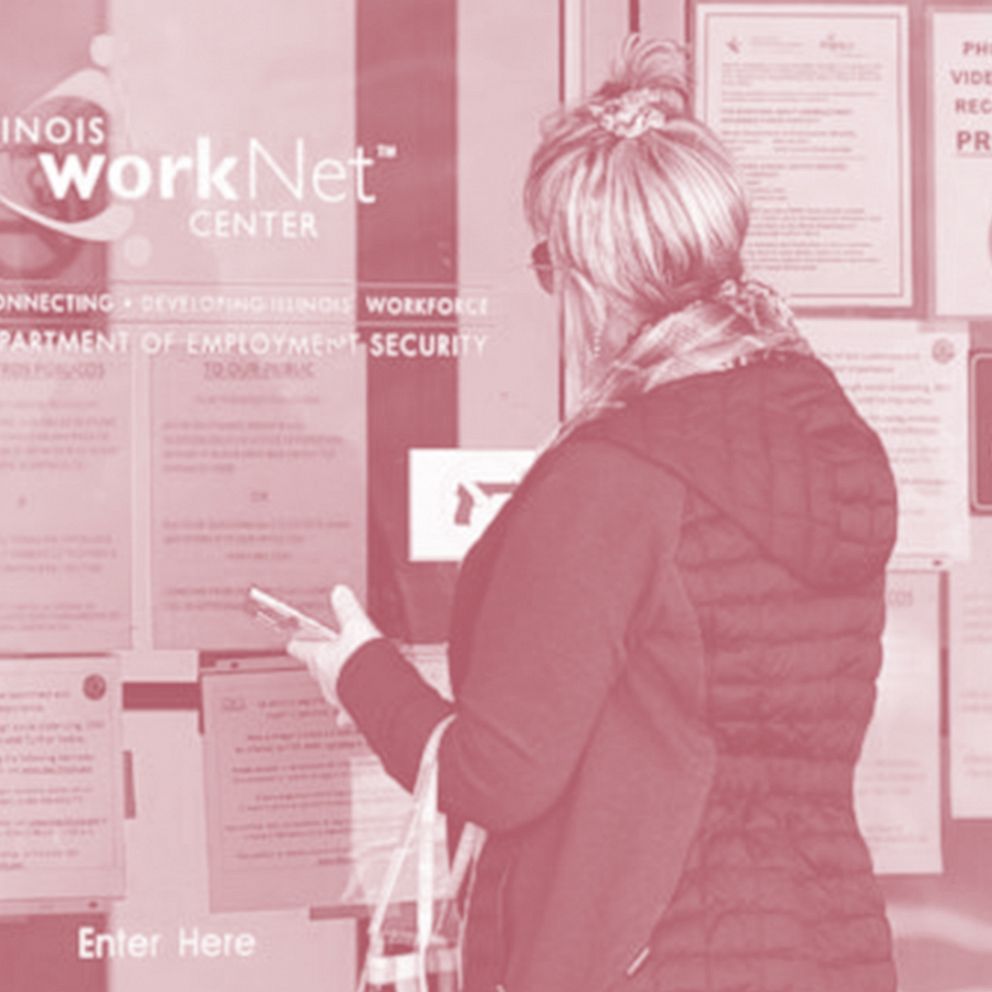'Ladies Get Paid' author Claire Wasserman shares advice for job hunting amid pandemic
Reset your job search approach with these simple strategies.
Amid the coronavirus pandemic, applying for a job can be tough.
With the unemployment rate hitting an unprecedented 14.8% last April, an estimated 22 million people were out of work due to the pandemic. And despite the economy slowly rebounding over the year, many people are still on the hunt for a job.
But Claire Wasserman, founder and author of “Ladies Get Paid” suggests that resetting your job strategy may be the key to landing a job.

“There are serious changes with serious consequences that we need to address if all of us and not just women are going to succeed,” Wasserman told “GMA.”
Through “Ladies Get Paid,” Wasserman has made it her mission to champion and support the professional and financial advancement of women. With many women struggling to land a job amid the pandemic, “Good Morning America” matched her with three women who are still searching for a job to provide them one-on-one coaching and strategies for success.
“This is a fantastic time to really dig into your values, your goals, your priorities,” Wasserman said. “I know this is a hard time for a lot of people, so before we begin, I just want us to remember, you are not alone. … There’s an unknown, it’s scary, but an unknown also means opportunity.”
Read on for some of Wasserman’s advice on navigating the job industry amid the pandemic.
'I have a goal to find or land my dream job in the next 60-90 days. Any tips?'
For TeMaya Eatmon, job-searching has been her full-time gig.
While Eatmon enjoys meeting people for coffee and interviews over Zoom and Skype, she said there’s still a disconnect during the actual interview process.
For a more personable interaction with interviewers on video conferencing platforms, Wasserman suggests taking up the space on your screen by putting yourself at the center of your frame and bringing energy into that small box. Also, wearing “something fabulous” and having something visible in the background is a good conversation starter.
When it comes to the actual interview, Wasserman advises to stand out by sharing how you accomplished the things you listed on your resume rather than simply stating what you did.
“No matter if it’s remote or not, you’re going to talk about your accomplishments. But I think what’s even more compelling and what will make you really stand out is sharing how did you do them,” Wasserman said. “Were you a fast worker, creative, resourceful? This is going to show who you are and it’s going to get them excited about what you’re able to bring.”
Wasserman also said to think of the interview as a learning experience and an opportunity to have a conversation.
“Make two goals for yourself,” she said. “Number one, what can I learn from this? What can I take away from this experience? And number two: How can I be present? How can I be in the moment?”
Wasserman's main takeaway: Be prepared with your notes and accomplishments, but at the end of the day, make sure to go with the flow.
'How should I reset my job search strategy?'
Kelly Becker has been unemployed for over 270 days and despite putting in the daily effort and setting up 20 interviews in December alone, she told “GMA” that she still hasn’t been able to land a job.
For those experiencing a similar roadblock, Wasserman suggests resetting your job search approach because some of the jobs you are applying for may not a good fit. While it’s important to keep options open, applying to too many jobs can be difficult for the applicant to keep personalizing each interview when there are so many to juggle, she said.
While searching for the job you want, Wasserman suggests picking up a side hustle in the meantime, which “will give you something to talk about when you go into the interview.”
“This will allow you to potentially discover something new about yourself or your interests,” Wasserman said. “This is where we’re taking the unknown and we’re turning it into an opportunity.”
Getting a career coach may help during this time, she said.
Wasserman said to seek out free professional groups where you can get feedback from people.
“If you feel like you really do need professional guidance, you can also start with a webinar, take a class. Then you can decide if you need more specific help one-on-one. Most career coaches will do a 15 to 20-minute call with you -- a complimentary call -- because this is also about a personality fit and not just the information that they bring.”
'I really care about corporate culture, how do I figure it out during a remote interview?'
Alisha Zucker, a mother of three from New York City, is on the hunt for a career in educational publishing. For Zucker, company culture is a top priority and she is struggling to find ways to understand a company’s culture and values amid the pandemic while applying to jobs remotely.
Wasserman said the best way to go about this is to do your research beforehand on job search sites and see how long people stay at the company, how long it takes for somebody to get promoted and who gets promoted.
“That to me is a total indicator of if this is going to be a company culture where you can thrive,” Wasserman said.
When it comes to the actual interview, Wasserman suggests to explicitly ask about career development opportunities and what that path for growth would look like for you. Also, reaching out to someone who used to work at the company will give you a sense of what the company’s values are instead of what is just listed on their website.
Finally, Wasserman suggested not to shy away from those potentially tough questions, including asking how a company approaches its inclusivity and diversity strategy.
“Ask them how are they measuring success and how are they holding themselves accountable,” said Wasserman.







